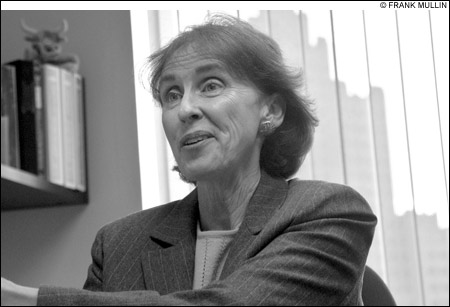Lincoln Chafee should be the next head of the Rhode Island Republican Party.
Although conservatives tend to dislike him, the outgoing US Senator would bring broad appeal, considerable prestige, and a real seriousness of purpose to the perennially ailing state GOP. What better mission for a man whose family name is locally synonymous with integrity and public service than to bring a semblance of parity to Rhode Island’s woefully lopsided General Assembly? (Plus, when you’re part of a $50 million fortune, you can afford to work for nothing.)
Unfortunately, Chafee took himself out of consideration last week, citing the exhaustion of a marathon campaign season, and saying that he wouldn’t accept the state Republican leadership post even if Governor Donald L. Carcieri asked him to take it.
OK, well how about Steve Laffey?
Clearly, it’s time for drastic action for Rhode Island Republicans. House Democrats last week regained one seat, basically negating the two additional GOP legislative spots claimed after an ambitious push in 2004, leaving the Dems with an utterly domineering 61-14 majority. Meanwhile, Speaker William J. Murphy — who was weakened during the last session by an alliance of Republicans and dissident Democrats — has considerably strengthened his position, claiming allegiance from 56 representatives.
ADVERTISEMENT
 |
Sure, Laffey is a divisive figure and he proved incapable of winning his own ward in his Senate primary challenge to Chafee. Yet no one can deny that the Cranston mayor is very smart, wildly energetic, and quite capable, when he feels sufficiently motivated, of focusing public attention on a subject. Love him or hate him, but you can bet Laffey wouldn’t abide the RI GOP’s status as a running joke. One suspects he could significantly improve on the status quo with a scintilla of effort.
But that isn’t going to happen, in part because of Laffey’s facility for making enemies.
Instead, the flaws of a party that fails to articulate a message, to adequately support candidates, or to pursue a consistent strategy through consecutive election seasons remain all too clear, and some top Republicans are in full spin mode, if not outright denial.
Suffice to say, changes in the state party leadership are vvery likely to occur when the state Republican Committee convenes in March — if not sooner.

HOT SPOT: Calls for chairwoman Morgan’s ouster are growing.
|
Patricia Morgan, who was Carcieri’s choice when she took on the GOP chairmanship in 2003, says she wants to continue in this role. Like many local Republicans, she blames the national Democratic tide for last week’s miserable showing of Rhode Island Republicans. It’s not a good sign for the chairwoman, though, when as centrist a political analyst as Brown University’s Darrell West flatly states, as he did Sunday on WJAR-TV’s 10 News Conference, “Patricia Morgan is simply ineffective.”
The next four months will offer plenty of time for would-be leaders of the Rhode Island GOP, ranging from younger activists to political veterans, to make their cases and to build support.
It’s no coincidence that West cited the need for Carcieri to instill fresh leadership for state Republicans and to be more active in supporting party-building efforts. The businessman-turned-governor rose to power, after all, by running against the General Assembly, and he framed his narrowly successful reelection campaign as a battle against “corrupt insiders.”
Carcieri has delivered on his rhetoric in some instances — most strikingly by riding herd on Beacon Mutual, a quintessential Rhode Island boondoggle. Yet he faces a tougher political landscape in his second term, and without better results, the governor risks being just another abject failure in advancing the cause of a competitive two-party system in Rhode Island.
How bad was it for republicans?
Carcieri barely repulsed a surprisingly vigorous challenge by Lieutenant Governor Charles Fogarty, although this seemed due more to a very aggressive Democratic get-out-the-vote effort and higher than usual voting in a mid-term election, thanks to the casino ballot question, than to the effectiveness of the challenger’s campaign.
Democrats otherwise swept the state general offices, even with considerable public wariness about Attorney General Patrick Lynch, because of the murky resolution of the criminal charges in the Station nightclub fire case. To find its most effective challenger, Secretary of State candidate Sue Stenhouse, the GOP had to look in the governor’s office.
On the federal level, Rhode Island’s congressional delegation will be without a Republican member, come January, for the first time in 30 years. Although US Representative Patrick J. Kennedy might have been a bit vulnerable due to his periodic penchant for unflattering headlines, the GOP put up a sacrificial lamb in the form of Jonathan Scott, a severely under-funded first-time candidate. It was even worse in the Second Congressional District, where, for the first time in almost 150 years, the GOP failed to even run a candidate.
And as Daniel Barbarisi reported in the Providence Sunday Journal, Republican majorities were dismantled on town councils in Foster, North Kingstown, Richmond, and Narragansett — with Foster going entirely Democratic. Republicans were completely removed from the Warwick City Council for the first time in that city’s history, and the GOP maintained just one seat on the nine-seat Cranston City Council.